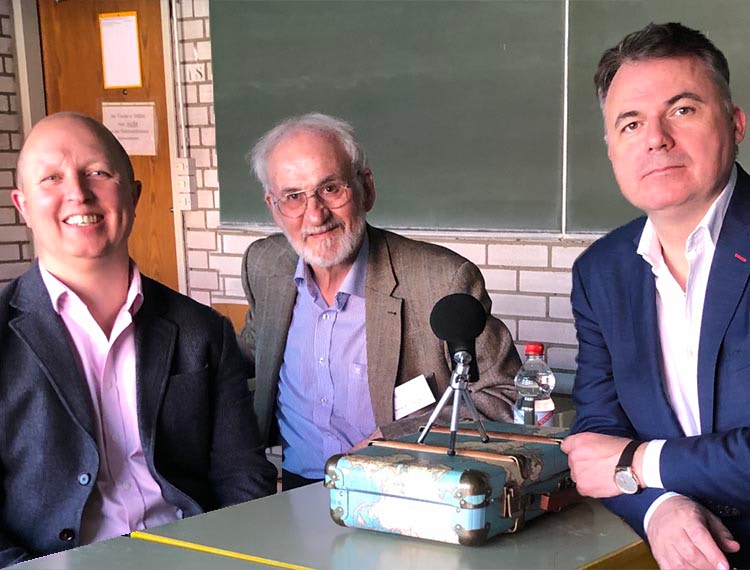March of the Robots, Dual Apprenticeship System and Flexibility: Prof. Felix Rauner and Richard Marsh talk to Tom for #SkillsWorld Germany

Tom Bewick: Hello and welcome to skill as well the podcast I’m on location this week in Germany where I’m attending the International Network on Innovative Apprenticeships (INAP) and I’m absolutely delighted to be joined by two participants and indeed a founder of INAP.
I’m joined by Professor Felix Rauner from the University of Bremen, who as it happens was also the founder of the Institute for Technology and Education in 1986. So welcome to #SkillsWorld Felix.
Also, I’d like to introduce somebody who’s well known to listeners back home in the UK and that is Richard Marsh from Kaplan International, who’s their apprenticeship partnership director. You’ll often get a chance to listen and watch. Richard at various apprenticeship conferences talking about brilliant work that Kaplan is doing, particularly around delivery of the new apprenticeship standards. So, welcome also to you Richard.
The German Dual System
Tom Bewick: Starting with Professor Felix Rauner and talking about the German dual system because I think there is a view back home in England that the dual model is the gold standard. Is this really a diamond apprenticeship program?
Arguably some of the reforms that have been happening in England in recent years around apprenticeship look to try and emulate some aspects of the German dual system. Could you just give us a brief overview of the history, and the German dual system, now and some of the key challenges around it.
Prof. Felix Rauner: Let me explain what we understand under the modern apprenticeship system. We differentiate between the old tradition oriented on scientific management.
There was a radical break after publishing the MIT study on lean production. MIT did a huge study on the automobile industry of Japan, the United States, and in America. The major finding was the productivity of the Japanese automotive industry was two times higher than in the United States and Europe.
The reason was that Japan have a lean production and a very, very innovative system of informal training of the workforce.
This was a starting point of two important new approaches in Germany:
- Shaping competence: Not doing what the management tells you, but you became innovative, and creative, and participate in the company in the organizational development. Very, very, important in the new apprenticeship system.
- Concept of occupations: We had, after the Second World War, 900 occupations and we developed a proposal to reduce it down to round about 200. The government said Okay, 300 might be okay.
Optimal number of apprenticeship standards
Tom Bewick: Okay well let’s just talk about the numbers of 900, 200, 300, because that’s what I think would be really, really, interesting for our audience back home where we’ve just marked for example the 400th standard of the new apprenticeship model. I think there are estimates which will, correct me if I’m wrong, about some estimates of around 700 standards eventually.
You talked about 900 at one point, after the second world war, 900 occupations. It came down to 300 / 200 then the government sort of took a view.
So, in your view what is the optimal number of standards? What drives standards in your apprenticeship model?
Prof. Felix Rauner: The name that we created was a new, dynamic, “core occupations”, to be open for development. We proposed a new verb of responsibility between the central agencies that develop occupational profiles, and some local agency. The local agency, who transfer the occupations into real, vocational, education training, should have more space for adapting the situation to their needs.
Responsibility for creating standards
Tom Bewick: So, Professor, who in Germany is creating the standards? Is it employers, is it employers and curriculum specialists? Is it teachers? Who are the people actually that are developing these competency standards in Germany?
Prof. Felix Rauner: We have a difficult situation. By law, the Minister for economy has the overall responsibility in so far, our vocational law, it is not an educational law. It is a law of the economy, and so far in this law are a lot of weaknesses. In this law they are not allowed to write pedagogical criteria and aims. So, you know it is an economic law, because the overall responsibility for education is a job of these states. So, states have a lower responsibility for education, and so far, we have a split responsibility to manage and organize the organisation of the dual system. The schools are managed and organised by the states, and the practical vocational training by the federal institutions at loss.
Tom Bewick: Well that’s a really good brief summary of what the dual system’s about.
Tom Bewick: Richard you were listening to that, and you’ve been involved, I think, with INAP, you said earlier in the presentation, since 2011. So, reflections on what Professor Felix is just saying there about the standards development process here?
Richard Marsh: I think INAP is a fantastic forum to hear from people, and organisations, that have been doing this for a long time. Germany is still the only country that has had a big scale, high quality, dual apprenticeship program for four decades. So, it is still the one that we look to because of the scale as much, as anything. The concept of how many trades, or core occupations there should, be is a real live topic in the UK. We’ve moved away from a framework of trades and occupations, which were relatively broad based, and given employers the opportunity to be more creative and flexible around creating apprenticeship standards where they’re required. I think sometimes we try and cap the numbers, something is lost in translation. In an industry like accountancy we might have apprenticeships at different levels, and we count those as individual standards. In the German model, it is one trade and there would just be one apprenticeship. So actually, I don’t think the numbers are quite as disparate as they sometimes look, because we divide by level, whereas in Germany you start at maybe a lower level, and finish at a higher level but it’s classes as one apprenticeship.
Modern challenges of the dual system
Tom Bewick: Professor, I’m coming to the modern day, around the dual system. What are some of the challenges that you see with the model?
Prof. Felix Rauner: So, we have more challenges. The first one is the governance tradition. The vocational schools are extremely important for the competence development of the apprentices. But, in our country the colleges are junior partners, because by law they are governed by the states, not by the central government. The central government and the practical part of the dual system, is the most important part and all the states and the colleges have to run behind this initiative and to adapt their curricula to the, let’s say development of the Ministry for Labour, which is really a problem.
Prof. Felix Rauner: It is different in Switzerland. In Switzerland they change the constitution. And now they have a unique governance of the whole dual system. It’s an integrated system, but it’s not in Germany.
Tom Bewick: Well Professor, that’s really interesting, because of course the idea that there’s not tensions, also in our own system. Whether that’s between national and local, between employers and educational providers.
Flexibility for local action
Tom Bewick: Richard, just listening to that, any sort reflections about some of the challenges? I mean we know we have further education colleges that aren’t as active in the apprenticeship arena as arguably the similar institutions are in Germany. There is this ongoing debate about the extent to which apprenticeship reforms are being driven from the top down, very centralised, not much scope and flexibility for local action, although again that’s changing with things like the devolution of the adult skills budget. Thoughts on that?
Richard Marsh: So, we tried to create an equivalent trade representation body with the sector skills councils, 10-15 years ago to do the same role as the trade bodies in Germany. But they were never really seen overall, as the genuine voice of employers. So, the government has gone further now, obviously with the Trailblazers, by giving employers the pen, and ask them to write the apprenticeships. It may be that we’ve gone too far, because there’s been very little role for education providers in the drafting. When you come to realising the apprenticeship standards, and delivering them, there isn’t a curriculum there. There is only a list of objectives that the employers want from the program. There hasn’t been the consideration as to how to train, and to lead on these programs. It may be that we’ve swung too far the other way. It’s interesting that you say that Switzerland have managed to balance the roles of the educators, and education establishments, with the employers in creating apprenticeships that work for both parties.
The problem of over specialisation
Prof. Felix Rauner: As I said, Germany started for about three or two decades to specialise their occupations. So, we have formally 320 occupations, but most of these occupations are split up into separate occupations. That means in reality it’s not 320. We went back to tailor this and we have today, round about 1000 specialised occupations. That is really a problem.
Tom Bewick: You see it as a problem, the proliferation of these different occupation routes, you think is a problem?
Prof. Felix Rauner: It is a problem, because vocational schools are not in a position to build classes of these specialised occupations. They can’t because there are not enough, if they have only three apprentices in it so far, it’s really a problem. We have a new differentiation in the work organisation. We need a holistic understanding of modern occupation. That means core occupations, open for dissemination in relation to the interests and competencies of the companies. So, it is a very modern problem. We had this at the beginning, after 2000, with the core occupations, but then things changed again, and the central agency started to specialize their occupations.
Tom Bewick: In your view, this is going in the wrong direction? Reflections on that Richard?
Richard Marsh: That’s very interesting and relevant. There’s the pragmatic fall out, as you’ve described, that you might not find enough people to form a cohort of software analysts on a Tuesday night in Huddersfield, because you’ve made it quite a narrow specialism. There’s also a more fundamental point, because one of the things that we’ve really struggled with in the UK, is our productivity. What’s really interesting is Felix is relating productivity to the depth of training through apprenticeships. If people are multi-skilled I think you’re saying that they can be more productive. Whereas if you specialize too much, and people have very narrow job roles, that impacts on their ability to add to the productivity of their organisation. I think that’s a level of analysis that we don’t often get to in the UK.
The Fourth Industrial Revolution: “March of the Robots”
Tom Bewick: Back to the core standards sort of concept, there are bigger labour market concepts around at the moment. The Fourth Industrial Revolution, “march of the robots”, as it’s sometimes called you know, the role of artificial intelligence. Some of these debates, as you know, go all the way back to the 70s as well. From what you were saying, there’s a problem with too much specialization. In terms of the both experience of the Apprentice, because it becomes very narrowly defined, and who knows occupation specialism might not be around in five years’ time. But coming back to something you said Professor right we start this interview about one of the key drivers really for the German dual system, it was about Germany’s relative productivity compared to a major international manufacturing competitor like Japan. Where is that debate now in the German dual system where we see all the economies, apart from America actually, signalling pretty sluggish economic growth. Potentially Germany’s on the brink of a recession particularly in manufacturing. What’s the answer to that, with something like the apprenticeship dual model?
Prof. Felix Rauner: This is right, apprenticeships are a very important dimension of our production system in Germany. A huge percentage of strong industries offer the apprenticeship tradition as a part of this. So far Germany has a very good tradition, and development is okay. But my position as a researcher is also to discuss about weaknesses, to improve the system. One for example, that’s a weakness is the splintered curriculum. We have one curriculum for the practical education and training, that is produced by the agencies of the federal state. Every state has the responsibility to produce their own curriculum for the vocational schools and the ban is under the umbrella of education in the overall economy. So far, it’s not so easy for these two parts to fit together. My proposal for ages is to develop an integrated curriculum. To say this is your part in the integrated curriculum, and this is your part in the integrated curriculum.
Tom Bewick: It’s fascinating, Richard final word to you.
Richard Marsh: Interesting that it’s owned by the Departments of business. Our apprenticeship reform was started by Department of Business, finished by Department for Education, which is why sometimes the front end of the horse does it match the back end.
Tom Bewick: Absolutely. Gentlemen thank you very much for joining me on this podcast today. We can actually probably go on and talk a lot more about the strengths and weaknesses of the German and English apprenticeship models, but I’m afraid that’s all we have time for today. Thanks for joining me!
{https://soundcloud.com/fenews/felix-rauner-and-richard-marsh-talk-to-tom-for-skillsworld-germany}







Responses